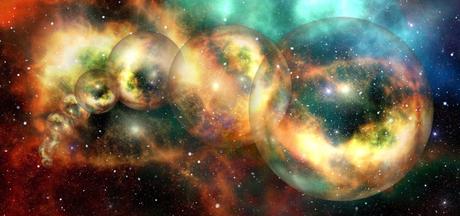
I have have been exploring the observations around cosmic fine tuning, and I’ve explained the possible explanations for it are either:
- Natural necessity
- Chance or
- Design
Given the incredible coincidences that Sir Fred Hoyle observed that makes nature life permitting, seems like an incredible assumption to say either that the universe HAS to be this way, or it just happened to be this way by chance.
To increase the odds for a finely tuned universe by chance, some have suggested that perhaps there are an infinite number of parallel universes, all with slightly different configurations of cosmological constants. If that is how things are, then there are just a few life permitting parallel universes in existence, and we happen to inhabit one of them.
SO – the universe is not designed by a designer (God). Rather, we just happen to inhabit a parallel (or bubble) universe that is life permitting. It was bound to happen some time, given the infinite number of parallel universes that exist.
I love Star Trek as much as the next guy. But – I don’t buy this idea. There are problems.
First – it seems to violate Occam’s Razor. William of Occam was a Franciscan Friar who observed an important problem solving principle. “Entities should not be multiplied without necessity.” In other words, when we look at the WHOLE problem, to identify the correct solution we should not make it more complicated than necessary. We should go with the simplest possible answer that meets the conditions reflected by the whole problem.
When we posit the multiverse, we are ignoring three simple solutions (chance, natural necessity and design) and positing a much much more complex solution. An infinite number of universes, and a mechanism for generating each one.
The multiverse theory would not violate Occam’s Razor if I can show that none of these simpler options work. But I’ve heard no one prove to me that a universe designed for life is impossible. So – until that happens, I’m going to be sceptical of a solution that’s just too complicated (the Multiverse theory).
Second – the multiverse theory requires that an impossible, infinite series of events has and will occur. An infinite number of universes will pop into existence. The problem here is another philosophical one. You cannot have an actually infinite number of events in the real world, although you can have the idea of an infinite number of events in your mind. Why?
Imagine you have laid out a line of dominoes and you start them dropping, one at a time. Each one knocks the next one over until you reach domino 1, which then knocks over the final domino 0. You can actually do this experiment if the number of dominoes is an absolute number (say N). You start at N, and drop the dominoes till you reach 0. But if N is infinite, then there are an infinite number of dominoes in the line. You will never reach dominoes 1 and then finally 0, because you cannot step through an infinite number of events one at a time in nature.
The multiverse theory posits the idea that an infinite number of universes have existed, and then another one pops into existence, and then another. Like dominoes 1 and 0. This does not make sense.
If there is a multiverse, then it must have had an absolute beginning, an ultimate origin, and a particular number of parallel universes have appeared. This idea has been confirmed by the Borde-Guthrie-Vilenkin theorem which requires an absolute beginning to an expanding universe. This would apply to one universe, or a parallel set of universes.
An infinite multiverse is logically and naturally incoherent.
Third – there is absolutely no empirical evidence that a multiverse exists. It’s a very cool idea that allows the rebooting of beloved franchises (Star Trek) in the real world. But nothing more. Worse, scientific methods cannot prove or disprove it. Therefore to try to solve the fine tuning problem by appealing to a baseless assumption sounds like a really bad idea!
Fourth – a universe generator still needs to be fine tuned. Right? Because there has to be an absolute starting point for a finite number of parallel universes, there has to be something that causes these universes to come into existence. This therefore pushes us back to the original problem. Why is the multiverse generator finely tuned to produce multiple universes?
Fifth – chance and natural necessity seem unlikely explanations for the multiverse generator. But a cosmic designer seems a much better explanation. And so we are back to God as the inference to the best explanation for the existence of the universes.
Summary
I don’t buy multiverse as a solution to the fine tuning problem, though I do accept it as a solution to the cinema, TV and literature problem…how do we keep this story moving forward?
